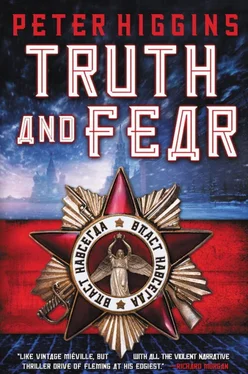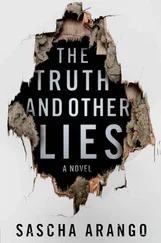Florian picked up the main route east. The outskirts of Mirgorod diminished to a tideline of subsistence enterprise–one-shed factories, workshops and junkyards, semi-collapsed smallholdings–but the road was getting more crowded, not less, and all the traffic was going in one direction. Away from the city. There were a few trucks and one or two private saloons, but mostly it was horse-drawn wagons and carts and nameless antiquated things hauled by donkeys and bullocks. There were whole families just walking, pushing prams and handcarts, lugging duffel bags, dragging suitcases along the ground, wearing layers upon layers of clothing to keep warm and leave room in the bags for more. The polished black staff car with its Vlast pennant drew hostile glares. From time to time somebody thumped the coachwork or spat on a window. Florian drove in silence, drumming his fingers on the wheel.
It took them hours to get clear. At last the traffic thinned out and Florian gunned the throttle. They were on the open road east of Mirgorod, skirting the southern shore of Lake Dorogha. It was just after six but twilight was already closing in.
‘Tell me about Novaya Zima,’ said Lom.
Florian tossed the road atlas onto the back seat.
‘Follow the Zelenny mountains north,’ he said. ‘You’ll find it.’
Lom found Mirgorod and started turning pages. Page after page eastward from where they were, the country was a flat expanse of pale green, spattered with small blue lakes and the hairline threads of rivers. The atlas was a Solon and Dutke Standard & Comprehensive : the best you could buy, which wasn’t saying much. Only the largest towns and cities were shown, their names in florid black-letter script. There were a few highways picked out in pink, but citizens of the Vlast didn’t make long journeys by road. They used the slow looping sweeps of the waterways or, if they could afford it, the transcontinental trains. Most roads weren’t even shown, and those that were mapped weren’t necessarily there, or still maintained, or even passable. The same went for the railways.
Even the map-green of the empty landscape was optimistic. It belied featureless horizons of sandy soil and scrubby grassland, or the silent monotony of birch and moss. If green on a map meant anything, it meant flat. For thousands of miles east from Mirgorod nothing rose more than a few hundred feet above sea level. Not until you reached the Zelenny Mountains, a third of the way between the city and the edge of the endless forest. On the map the Zelenny range was a north–south spine of taupe-shaded contours, but in reality they were scarcely mountains at all, just a spine of uplands slightly too elevated, distinctive and topographically important to be called merely hills. The spine of the Zelenny ran north all the way to the coast and continued out across the water, becoming two long thin islands hooked into the belly of the Yarmskoye Sea like a crooked skeletal finger. The south island was contoured taupe, the north island was the blank and featureless white of year-round ice, and adrift in the sea near the islands was a name in the smallest and faintest typeface that Solon and Dutke ran to: NOVAYA ZIMA.
‘That’s it?’ said Lom. ‘That’s where Chazia is going?’
‘Yes,’ said Florian.
‘It’s nowhere. Why the hell would Chazia go to a place like that?’
‘That’s what I want to know,’ said Florian. ‘A couple of years ago the Armaments Minister, Dukhonin, started spending money on his own initiative. He was Vlast Commissar for Industry then, but this was a private venture: secretive appropriations, diverted funds, nothing accounted for. He requisitioned building materials, heavy machinery, oil, coal. And it was all for Novaya Zima. He flooded the place with tens of thousands of conscript workers.
‘And then, while the heavy labour was still flowing in, Dukhonin started recruiting persons of a different kind: managers, architects, doctors, teachers. He collected specialists. Engineers. Chemists. Mathematicians. Astronomers. Physical scientists of every conceivable discipline. And always the best. Outstanding in their discipline. I say recruiting , but it’s a euphemism of course. Some of the people Dukhonin sent to Novaya Zima were zeks, prisoners he pulled out from other camps. In other cases bespoke arrests were made, and an eminent few were simply invited, though it was always made clear to them that refusal was not an option. And no one he sent north has ever come back. None of them has ever been heard from again. No communication comes out of Novaya Zima. None at all.’
‘So what is he doing up there?’ said Lom. ‘It sounds like he’s building a city. But why build a city up there? It’s thousands of miles from anywhere.’
‘I don’t know,’ said Florian. ‘I’ve been combing the archives for weeks, and I’ve found out some of what’s been sent up there, but as to why… there is no indication, none at all. And Dukhonin is dead now.’
‘I read about that in the paper,’ said Lom. ‘Josef Kantor killed him.’
‘Yes,’ said Florian. ‘Perhaps it was Kantor. Maybe.’
‘What do you mean, maybe?’
‘It is something of a coincidence, don’t you think?’
Lom felt his irritation rising again. He wished Florian wouldn’t play games.
‘What?’ he said. ‘What’s a coincidence?’
‘Dukhonin dies and the very next day Chazia sets off for Novaya Zima with Maroussia Shaumian in tow.’
‘You think Chazia killed him?’ said Lom.
‘It is not unlikely, certainly. And there is something else.’
Florian hesitated again.
‘For fuck’s sake,’ said Lom. ‘ What else?’
‘Perhaps you have heard someone speak already of the Pollandore? Perhaps Maroussia Shaumian has mentioned this to you?’
‘Yes,’ said Lom cautiously. ‘I’ve heard of it.’
‘The extraordinary cargo to which I referred a moment ago,’ said Florian. ‘The cargo on Chazia’s train? It is the Pollandore.’
Lom’s stomach lurched. He felt his skin prickle. A chill in his spine.
‘Shit,’ he breathed. ‘Shit. What the hell is Chazia up to?’
‘I don’t know,’ said Florian. ‘But you see now? You understand why I came for you? Why I think we should join forces?’
An hour later twilight was thickening into night. Florian flicked on the headlamps. They were passing through level country, undrained and undyked, a patchwork of woodland and shallow lakes and reed beds. The beams splashed off scrubby birch trees and alders, vegetable patches and makeshift fences, stands of hogweed. From time to time a weathered wooden cabin rose out of the darkness and disappeared behind them.
Lom had been turning over what Florian had told him. He didn’t doubt it, not really, but it didn’t make sense: the more he thought about it, the less it fitted together, and a big part of the puzzle was Florian himself. Who was he? What was he? What was he keeping back? He glanced at Florian’s shadowy profile.
‘You can’t drive a car all the way to Novaya Zima,’ said Lom, remembering the thousands of miles of empty green on the map. ‘It isn’t possible. You need to tell me where we’re going.’
‘Still you do not trust me, Vissarion?’ said Florian patiently. ‘We are going to Novaya Zima, but not by car. We are making for a small lake called Chudsk, but we will not reach it for some hours yet. Why don’t you get some sleep?’
‘I don’t need to sleep. You could let me drive for while.’
Florian hesitated.
‘Sure,’ he said. ‘Fine.’
Florian brought the car to a stop, killed the engine and dropped his hands off the wheel with a sigh. When he cut the headlamps and wound down the window, an immense silence rolled in around them, and with it the smell of damp earth and cold night air. Tiny night sounds could be heard above the ticking of the cooling engine: the wind moving across grass and snow, the nearby trickle of water, the shriek of a fox. Lom got out and walked round to get in behind the wheel. Florian slid across into the front passenger seat.
Читать дальше


![Кэмерон Доки - Правда и ее последствия[Truth and Consequences]](/books/79610/kemeron-doki-pravda-i-ee-posledstviya-truth-and-con-thumb.webp)









